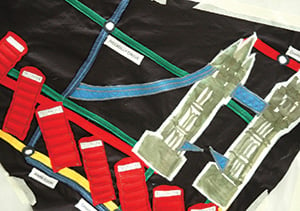Taking the lead
Alexandra Bennett and Miranda Stearn describe the challenges of planning for the Cultural Olympiad in an Outer London borough on the ‘wrong’ side of the city

In the London Borough of Richmond upon Thames, strategic leadership for the Cultural Olympiad sits with the Local Authority’s Arts Service. The Head of Arts reports to the Olympics Working Group, which in turn reports to the Local Strategic Partnership. Taking on this role has provided both opportunities and challenges as we work to shape a meaningful Cultural Olympiad offer for the borough through our own programming and through the strategic lead we provide for local cultural and heritage sector partners.
Given the scarcity of dedicated resources to deliver the Cultural Olympiad, we took a pragmatic approach looking at ways to incorporate existing festivals and align our plans with local anniversaries and events. As an Outer London borough on the ‘wrong’ side of the city, our approach needed to take into account the spectrum of local attitudes, including ambivalence and scepticism. There were also more general challenges in articulating the concept of the Cultural Olympiad. If Richmond were to engage we needed to provide a strong lead and clear framework for engagement, while ensuring that local stakeholders were able to play an active part in defining what the Cultural Olympiad could be for Richmond. In January 2008, we hosted a forum for stakeholders representing public, private and third sector organisations to tackle these questions. What emerged was a commitment to focus on ‘what makes Richmond special’ as a key theme, encouraging partnerships between cultural organisations, tourism, international links, opportunities for young people and volunteering.
We developed guidance for cultural organisations to explain five ways in which local programmes might be part of the Cultural Olympiad. These included: involvement in the Major Projects; achieving the Inspire Mark; involvement in sub-regional and sector-led initiatives such as Museum Libraries and Archives Council’s (MLA) Setting the Pace; involvement in London Organising Committee for the Olympic Games (LOCOG) events; and developing projects aligned with the values of the Cultural Olympiad but not carrying official LOCOG branding.
This guidance informed our forward-planning, and since 2008 we have participated in Open Weekend events, events to mark Olympic and Paralympic handovers, MLA’s People’s Record (which was granted the Inspire Mark), and the Big Dance (London’s Legacy Trust UK programme). Involvement in Stories of the World, a major project which presents new museum exhibitions created by young people across the UK, has enabled young people in our borough to have a stake in a national initiative with full Olympic branding.
Taking the local strategic lead, we were keenly aware of the need to devise a structure which would provide opportunities to be part of the Cultural Olympiad for organisations that were less able to engage with major projects and other LOCOG-led events, due to the scale or nature of their activities. There was enthusiasm amongst the local cultural sector and we needed to direct this energy into tangible projects. For 2010, we developed ‘Heritage Now!’, a year-long festival celebrating the history of the borough. The concept encompassed a number of special projects delivered by the local authority and our partners, often collaborating with contemporary practitioners to rediscover Richmond’s heritage in topical fashion.
The first two years of Cultural Olympiad activity have yielded valuable lessons which will inform our approach going forward. These include: the importance of engaging local stakeholders and providing a structure for their involvement, so that a critical mass of activity can take place without dedicated funding; a place-based emphasis that enables Cultural Olympiad activity to draw upon and encourage civic pride; and an embedded approach celebrating the Cultural Olympiad through existing events and programmes. The challenge remains to ensure that participants are able to make a meaningful link between these activities and the experience of being an Olympic host nation, in the context of limited public familiarity with the whole concept of a ‘Cultural Olympiad’.
As we look forward to 2011 and the final countdown to the Games, the cultural landscape of the UK presents challenges on a scale un-thought-of in the excitement of 2008’s handover festivities – yet our original approach still feels fit for purpose. For the vast majority of arts organisations, the Cultural Olympiad never had its own budget, making it at once nebulous and resilient, difficult to pin down but also difficult to extinguish. In Richmond, we will continue to find ways to engage residents, visitors and partners across the whole cultural sector in our celebrations as we build momentum for the main event and beyond.
Join the Discussion
You must be logged in to post a comment.